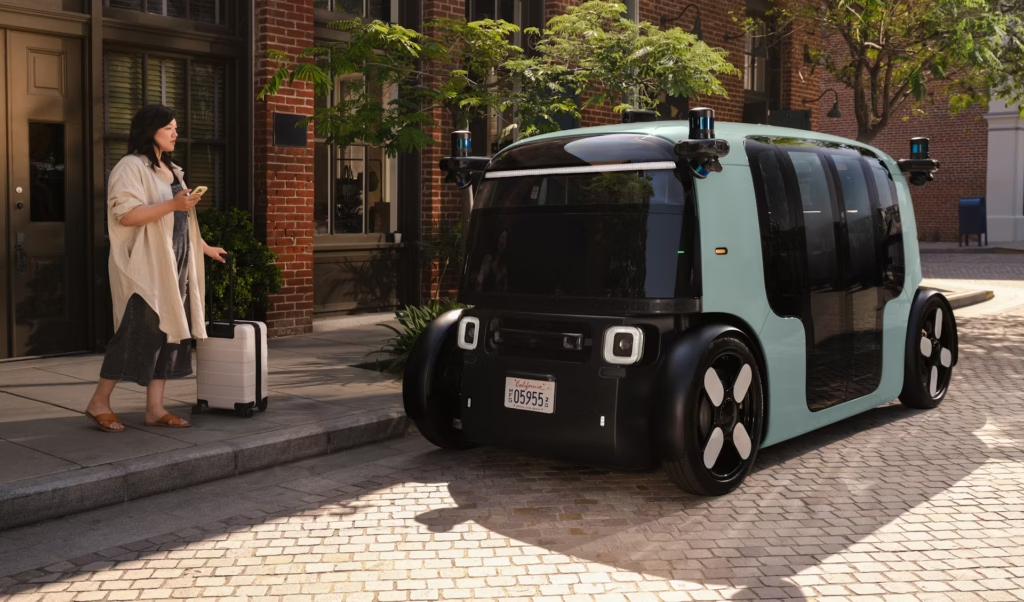Key Takeaways
- Tesla faces tough competition in RoboTaxis from Waymo and Zoox.
- Waymo’s partnership with Uber provides a ready-made customer base
- Zoox’s purpose-built vehicles set a new standard for RoboTaxi services
- Tesla’s reputation as an AV leader is at risk if it fails to deliver
Tesla, often seen as a pioneer in self-driving technology, has led advancements since introducing Autopilot in the Model S in 2015. Over the years, Tesla has consistently improved its software through over-the-air (OTA) updates. However, Competitors like Waymo and Zoox are now gaining ground, especially in the RoboTaxi market., where Tesla’s reliance on vehicle sales and semi-autonomous systems contrasts with competitors’ dedicated ride-service focus.
Competitor Advantage
Waymo

Founded in 2009 as a Google project, Waymo launched the first public RoboTaxi service in Phoenix in 2017. Now operating in cities like San Francisco, Los Angeles, and Phoenix, Waymo delivers over 150,000 weekly rides.. Their partnership with Uber has been a game-changer, tapping into a massive existing customer base and expanding plans to cities like Austin and Tokyo.
Zoox

Owned by Amazon, Zoox was founded in 2014 with a vision to design fully autonomous vehicles from scratch. Their purpose-built RoboTaxis, featuring no steering wheels or pedals, prioritize passenger comfort and automation. Zoox plans to launch its innovative service in Las Vegas in 2025., directly challenging Tesla with its futuristic and efficient design.
Tesla’s Challenges
Technological Shortcomings
- Tesla’s reliance on cameras and neural networks lacks the redundancy of lidar and radar., used by competitors to improve detection in poor conditions.
- Tesla’s data largely reflects supervised driving., less applicable for training fully autonomous systems compared to competitors’ dedicated testing fleets.
Regulatory and Liability Hurdles
- Tesla’s FSD system has faced scrutiny for safety concerns, delaying regulatory approval.
- Legal ambiguities over liability in autonomous driving accidents remain unresolved, creating barriers to deployment.
Intense Competition
- Competitors like Waymo and Zoox benefit from purpose-built vehicles, partnerships, and years of dedicated testing.
- Tesla repurposes existing consumer models like the Model 3 and Model Y, which lack the efficiency of vehicles designed exclusively for RoboTaxi services.
Infrastructure Challenges
- Tesla’s Supercharger network, while extensive, may struggle with the high turnover needs of a RoboTaxi fleet.
- Managing fleet logistics, including maintenance and cleaning, is uncharted territory for Tesla.
Divided Focus
- Tesla’s attention is split between EV production, energy products, and semi-autonomous systems., unlike competitors’ singular focus on RoboTaxis.
The Tesla RoboTaxi Dilemma
Tesla’s plans for a dedicated RoboTaxi vehicle are still years away. In the meantime, the company is exploring the possibility of using its existing fleet of Model 3s and Model Ys for RoboTaxi services. However, this approach comes with significant hurdles, such as managing charging, cleaning, and insurance for customer-owned vehicles.
Even if Tesla were to launch its own RoboTaxi platform, it would face the challenge of convincing users to adopt a new app—a hurdle Waymo has sidestepped by partnering with Uber. Without similar partnerships, Tesla’s path to scaling a RoboTaxi service could be slow and painful.
Tesla’s Reputation at Stake
While Tesla remains a leader in EV innovation, its position in the RoboTaxi race is uncertain. Competitors like Waymo and Zoox are leveraging focused strategies, partnerships, and purpose-built fleets to gain market share. For Tesla to compete, it must adapt, focus, and overcome key technological and logistical challenges in this rapidly evolving space.
Tesla’s ability to dominate the RoboTaxi market is not just a question of technology or infrastructure—it’s also a matter of public trust and perception. While Tesla is synonymous with innovation in EVs, its self-driving technology has faced scrutiny. If Tesla fails to deliver a successful RoboTaxi service, it risks tarnishing its reputation as a trailblazer in autonomous driving and an EV maker.









[…] Is Tesla Already Losing the RoboTaxi Race ? Waymo’s strategy contrasts sharply with Tesla’s. Tesla follows a vertically integrated model, designing and manufacturing cars with its proprietary Full Self-Driving (FSD) software. It is very unlikely that Tesla will try to sell their self-driving technology to competitors any time soon. Waymo, in contrast, takes a horizontal approach, aiming to serve as the technological backbone for numerous manufacturers, platforms, and services, embedding itself widely across the transportation ecosystem. […]